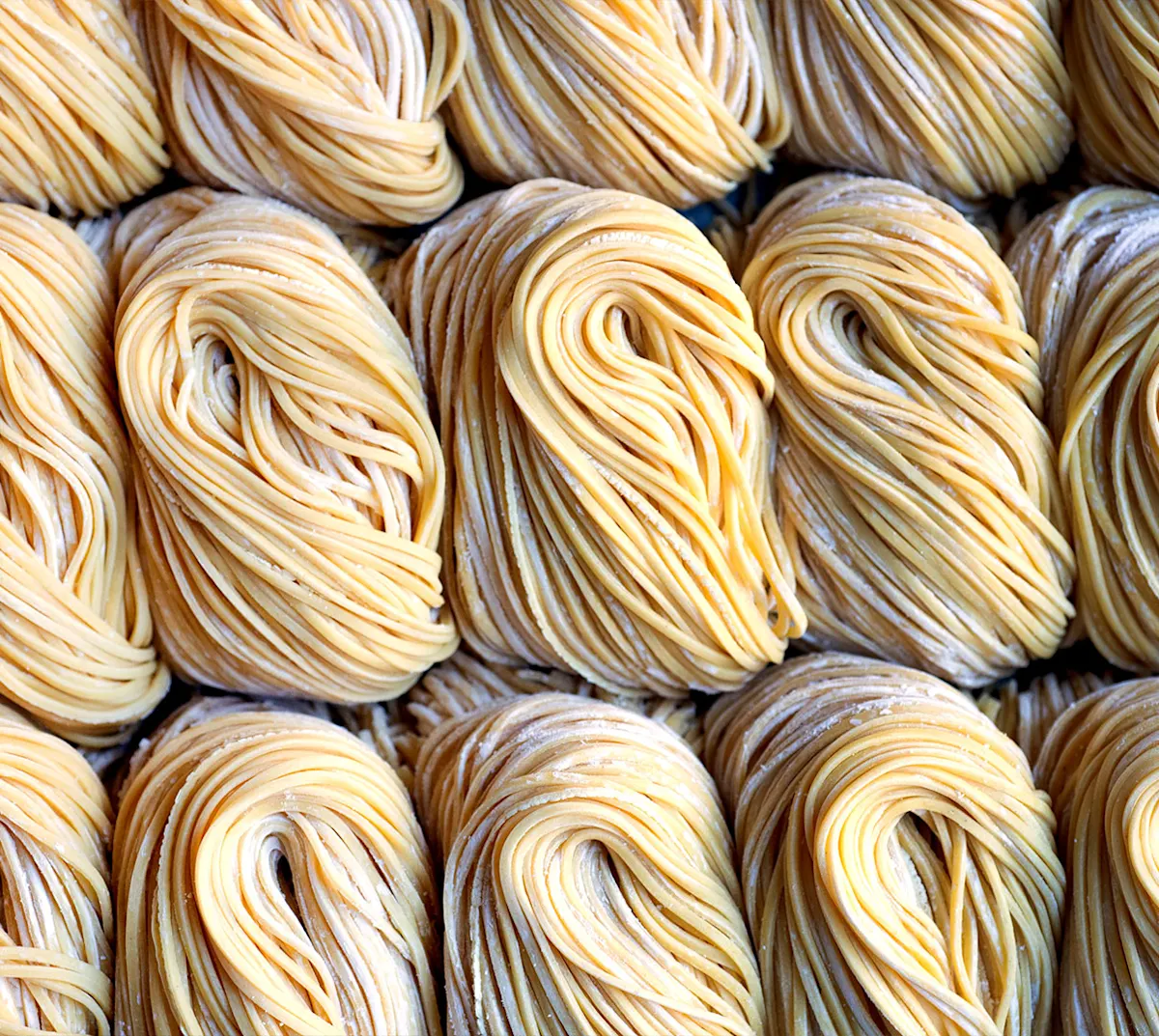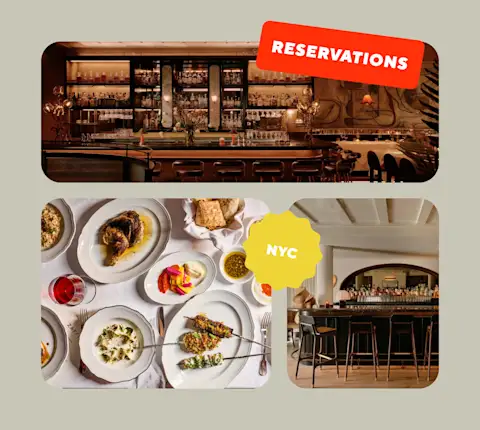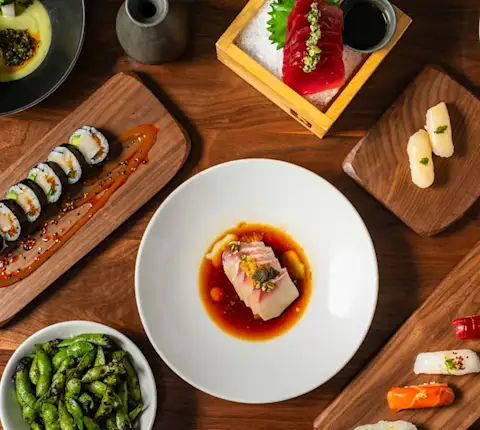* Este artículo incluye menciones de tiendas o marcas que son socias de DoorDash, y DoorDash puede recibir una comisión si eliges realizar una compra de estas tiendas o marcas.
Durante todo el año, residentes y viajeros acuden en masa al mercado flotante de Damnoen Saduak, en la provincia tailandesa de Ratchaburi, a una hora al suroeste de Bangkok. Aquí, estrechos botes de madera navegan por canales atestados de gente. Los vendedores ambulantes con sombreros de paja ofrecen una caleidoscópica variedad de frutas tropicales, novedosas camisetas con el lema “Yo estuve aquí” y platos típicos que van mucho más allá del conocido pad thai. Son estos platos los que sirven de inspiración para el restaurante Pure Thai Cookhouse de David y Vanida Bank, inaugurado en 2010 en el Upper West Side de Nueva York. Pero hay un plato en particular que se destaca: ba mee haeng, un plato de fideos secos con cerdo asado a fuego lento y carne de cangrejo al vapor, conocidos en el menú de Pure Thai como fideos secos de cangrejo y cerdo de Ratchaburi. Este plato sin caldo y profundamente brillante reúne todos los principios de la cocina tailandesa: salado, ácido y dulce.
Order from Pure Thai CookhouseEl amor de los Banks por este plato viene de lejos. Ambos crecieron en Ratchaburi y se conocieron oficialmente en una fiesta de la escuela secundaria. Pero David ya conocía a Vanida, o al menos la tienda de fideos HungZong de su familia, que ahora tiene 80 años, al igual que sus famosos ba mee (fideos de huevo al estilo chino). “La escuela estaba cerca de esta tienda de fideos y su tío [el de Vanida] vendía fideos [de HungZong] en mi cafetería”, explica David.
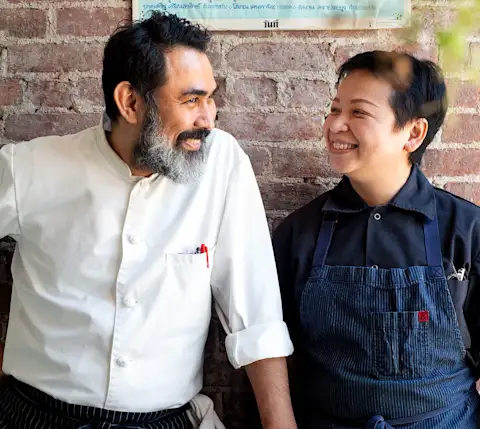
La habitación de la infancia de Vanida estaba situada justo encima de esa tienda y su familia lleva generaciones elaborando ba mee en Ratchaburi. Su abuelo era un agricultor de arroz que emigró a Tailandia desde el sureste de China en los años 50, trayendo consigo su herencia culinaria china. Empezó vendiendo fideos en un carro en los arrozales fuera de temporada (de mayo a noviembre). El padre de Vanida solo tenía cuatro años cuando la familia se mudó; a los 18 ayudó a ampliar el carrito de fideos de su padre hasta convertirlo en un restaurante en toda regla.
Años más tarde, mientras el padre de Vanida movía la masa de fideos con un palo de bambú, también golpeaba el techo para despertarla y que lo ayudara. Con el tiempo, la familia adaptó su cocina con ingredientes tailandeses, añadiendo a su plato de fideos jarabe dulce de azúcar de palma, salsa de pescado salada, vinagre de chile agrio y picante, y un condimento salado de nabo y daikon llamado tang chai/huah chai bpoh.
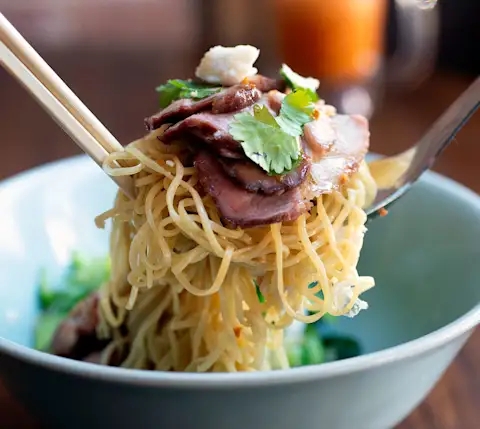
En 1996 David se mudó a Nueva York con la esperanza de convertirse en un chef como los que veía en la televisión, algo que no parecía posible en Tailandia por aquel entonces, y Vanida lo siguió en 1998. Se adentraron en la escena gastronómica neoyorquina y se enamoraron de su espíritu innovador. Cuando abrieron Pure Thai, los Banks introdujeron algunas pequeñas innovaciones, como la pequeña pila de gark moo salado (piel de cerdo crujiente) sobre sus codiciados fideos de cangrejo y cerdo.
Pero hay un aspecto del plato con el que no quisieron meterse: la receta familiar para elaborar los fideos, que incluye una mezcla de harinas ricas en proteínas que permite lograr la textura adecuada y huevos frescos (en lugar de pasteurizados o en polvo) para obtener fideos más ligeros y esponjosos. Siguiendo la tradición, David y Vanida empezaron a hacer ba mee a mano, pero la tarea se volvió demasiado laboriosa para satisfacer la demanda: empezaron a agotar las 40 porciones diarias que podían hacer a mano. Así que invirtieron en una máquina de fideos Yamato, que suele utilizarse para hacer ramen, y no volvieron la vista atrás. Ahora, en lugar de pasar varias horas haciendo a mano unas docenas de porciones, pueden hacer unas 60 en menos de una hora.
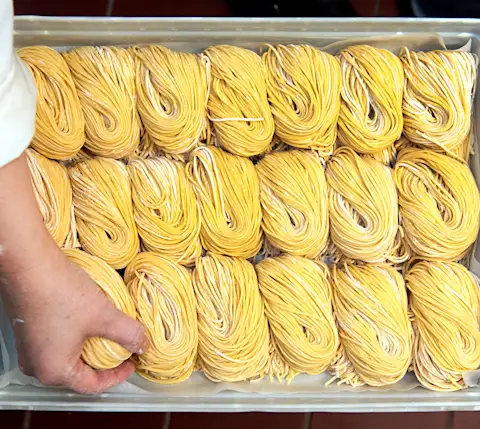
La máquina de fideos fue una mejora tan rentable que incluso influyó para que la familia de Vanida también hiciera cambios en HungZong. Compraron una máquina Yamato mucho más grande y ahora sirven entre 800 y 1000 porciones por día (más del doble de lo que servían antes de la adquisición) en sus dos locales de Ratchaburi. El local original de HungZong está en el mismo lugar que hace 80 años, y actualmente lo dirige la madre de Vanida.
“Siempre le dice a sus clientes que, si alguna vez van a Nueva York, visiten la tienda de su hija”, dice David. “También tenemos muchos clientes que van a Tailandia y quieren saber dónde está el local original”. Sea donde sea, hay un tazón de deliciosos fideos Ratchaburi esperándote.
Order from Pure Thai CookhouseCRÉDITO DE LA FOTO:
Fotografía: Michael Harlan Turkell


